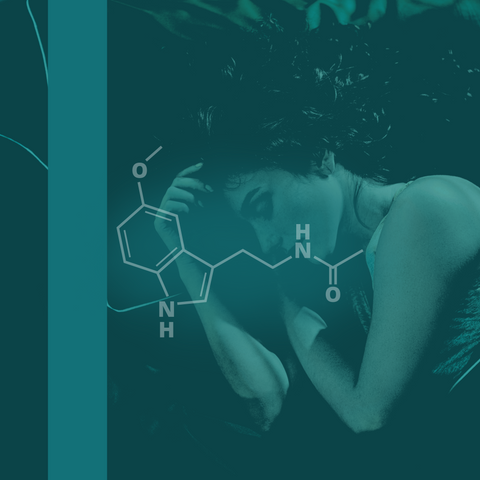
The majestic magnolia tree, celebrated for its aromatic flowers, also harbors a lesser-known gem in its bark. It has a long history of use. Traditional healers have valued this component, referred to as Houpo when used in traditional Chinese medicine, for its potential to alleviate stress, improve digestion, and enhance overall health.
Magnolol and honokiol
Magnolia bark promotes sleep
The science
- Targeting the GABA system: Compounds in magnolia bark enhance the activity of GABA, the brain's calming neurotransmitter. This helps reduce the neuronal overactivity that's common with anxiety and racing thoughts, promoting a state conducive to sleep [1,2,3].
- Antioxidant and anti-inflammatory effects: Magnolia bark extract may combat inflammation and oxidative stress, both of which can cause sleep disturbances [4,5,6].
- Improved sleep quality: Studies suggest magnolia bark extract not only decreases the time it takes to fall asleep but also increases the duration of deep sleep phases (non-REM and REM), which are crucial for feeling truly rested [7,8].
- Anxiety reduction: Research demonstrates that a blend of magnolia and phellodendron extracts can ease temporary anxiety, further promoting better sleep [9].
Magnolia bark for stress and anxiety
The science
- Enhancing the GABAergic system: Magnolia bark extract boosts the GABAergic system, which is crucial for calming the nervous system. GABA, a key inhibitory neurotransmitter, helps reduce overactive neurons that contribute to anxiety [10].
- Modulating cortisol: Magnolia bark extract can help regulate cortisol, the "stress hormone." Imbalanced cortisol contributes to anxiety, and magnolia bark extract may offer support in managing this [11].
- Neuroprotection: Research suggests magnolia bark extract interacts with the CB1 receptor, which is part of the endocannabinoid system, offering protective effects for the brain and potentially aiding emotional regulation [12].
- Support for premenopausal women: A study showed a blend of magnolia and phellodendron bark extracts significantly eased temporary anxiety in premenopausal women, indicating that it may be especially helpful for this group [9].
Enhancing brain health with magnolia bark extract
The science
- Neuroprotective effects: Magnolia bark extract activates the Nrf2 pathway, boosting cells' defense against oxidative stress – a key contributor to brain cell damage [13]. It also possesses strong antioxidant and anti-inflammatory properties, further protecting delicate brain cells [14].
- Pain management: New research suggests magnolia bark extract might offer pain-relieving benefits, particularly for neuropathic pain, potentially aiding in managing this debilitating condition [15].
- Cognitive functions: Studies indicate magnolia bark extract may improve memory and attention [16]. Additionally, research on mice suggests it could help prevent the buildup of amyloid plaques, a hallmark of Alzheimer's disease [16,17].
Magnolia bark can help against cancer
The science
- Inducing apoptosis: Apoptosis is programmed cell death, a natural process our bodies use to eliminate old or damaged cells. Cancer cells often evade apoptosis. Studies indicate that magnolol isolated from magnolia bark extract might help trigger apoptosis in cancer cells, potentially leading to tumor reduction [18].
- Inhibiting angiogenesis: Angiogenesis is the formation of new blood vessels. Tumors need a constant supply of blood to grow and spread. Honokiol may inhibit angiogenesis, thus potentially "starving" tumors [19].
- Suppressing cancer cell proliferation and migration: Studies of magnolia bark extract suggest that it could slow the division and migration of cancer cells, potentially hindering tumor growth and metastasis (the spread of cancer to other parts of the body) [20].
Magnolia bark for a healthy gut
The science
- Promoting gut motility: Magnolia bark extract appears to have a positive effect on gut motility, which refers to the contractions that help move food through the digestive tract. This could potentially help with constipation [21].
- Reducing inflammation: Chronic inflammation in the digestive system can contribute to various gut issues. Magnolia bark's anti-inflammatory properties could help alleviate this inflammation, potentially offering relief for conditions like inflammatory bowel diseases [24].
- Protecting against ulcers: Some animal studies suggest that magnolia bark extract could help protect against stomach ulcers due to its anti-inflammatory and antioxidant effects [23].
- Potential support of gut bacteria: Preliminary research hints that magnolia bark might have a positive influence on the balance of gut bacteria (microbiota), which is crucial for overall digestive health [22].
Protect your heart with magnolia bark
The science
- Antioxidant and anti-inflammatory action: Oxidative stress and inflammation in your body can damage blood vessels and contribute to heart disease. Magnolia bark extract, with its strong antioxidants like honokiol and magnolol, could help protect against these processes [27].
- Blood pressure regulation: Some animal studies suggest that magnolia bark extract could help regulate blood pressure. However, human studies are needed to fully understand this potential effect and if it translates to humans [25].
- Cholesterol management: Limited studies hint that magnolia bark might influence cholesterol levels, potentially promoting healthy balance. More research in humans is needed to determine the significance of this effect [26].
Further research: Magnolia bark's full potential benefits
The side effects of magnolia bark
Important considerations in studies and dosages
- Limited human studies: While research is promising, much of the existing evidence comes from animal studies. More extensive studies on humans are needed to fully establish the scope and effectiveness of magnolia bark extract.
- Dosage and forms: The optimal dosage and preferred form (supplement, tea, etc.) of magnolia bark extract to attain these many health benefits still require further investigation.
- Potential adverse effects: Magnolia bark is generally considered safe but could cause mild side effects like digestive discomfort.
Conclusion
References
- Alexeev, M., Grosenbaugh, D. K., Mott, D. D., & Fisher, J. L. (2012). The natural products magnolol and honokiol are positive allosteric modulators of both synaptic and extra-synaptic GABA(A) receptors. Neuropharmacology, 62(8), 2507–2514. https://doi.org/10.1016/j.neuropharm.2012.03.002
- Ma, H., Jo, Y. J., Ma, Y., Hong, J. T., Kwon, B. M., & Oh, K. W. (2009). Obovatol isolated from Magnolia obovata enhances pentobarbital-induced sleeping time: Possible involvement of GABAA receptors/chloride channel activation. Phytomedicine : international journal of phytotherapy and phytopharmacology, 16(4), 308–313. https://doi.org/10.1016/j.phymed.2008.12.007
- Liwinski, T., Lang, U. E., Brühl, A. B., & Schneider, E. (2023). Exploring the Therapeutic Potential of Gamma-Aminobutyric Acid in Stress and Depressive Disorders through the Gut-Brain Axis. Biomedicines, 11(12), 3128. https://doi.org/10.3390/biomedicines11123128
- Irwin, M. R., Olmstead, R., & Carroll, J. E. (2016). Sleep Disturbance, Sleep Duration, and Inflammation: A Systematic Review and Meta-Analysis of Cohort Studies and Experimental Sleep Deprivation. Biological psychiatry, 80(1), 40–52. https://doi.org/10.1016/j.biopsych.2015.05.014
- Lin, Y. R., Chen, H. H., Ko, C. H., & Chan, M. H. (2006). Neuroprotective activity of honokiol and magnolol in cerebellar granule cell damage. European journal of pharmacology, 537(1-3), 64–69. https://doi.org/10.1016/j.ejphar.2006.03.035
- Walker, J. M., Maitra, A., Walker, J., Ehrnhoefer-Ressler, M. M., Inui, T., & Somoza, V. (2013). Identification of Magnolia officinalis L. bark extract as the most potent anti-inflammatory of four plant extracts. The American journal of Chinese medicine, 41(3), 531–544. https://doi.org/10.1142/S0192415X13500389
- Chen, C. R., Zhou, X. Z., Luo, Y. J., Huang, Z. L., Urade, Y., & Qu, W. M. (2012). Magnolol, a major bioactive constituent of the bark of Magnolia officinalis, induces sleep via the benzodiazepine site of GABA(A) receptor in mice. Neuropharmacology, 63(6), 1191–1199. https://doi.org/10.1016/j.neuropharm.2012.06.031
- Ma, H., Jo, Y. J., Ma, Y., Hong, J. T., Kwon, B. M., & Oh, K. W. (2009). Obovatol isolated from Magnolia obovata enhances pentobarbital-induced sleeping time: Possible involvement of GABAA receptors/chloride channel activation. Phytomedicine : international journal of phytotherapy and phytopharmacology, 16(4), 308–313. https://doi.org/10.1016/j.phymed.2008.12.007
- Kalman, D. S., Feldman, S., Feldman, R., Schwartz, H. I., Krieger, D. R., & Garrison, R. (2008). Effect of a proprietary Magnolia and Phellodendron extract on stress levels in healthy women: a pilot, double-blind, placebo-controlled clinical trial. Nutrition journal, 7, 11. https://doi.org/10.1186/1475-2891-7-11
- Ham, H. J., Lee, Y. S., Yun, J., Han, S. B., Son, D. J., & Hong, J. T. (2020). Anxiolytic-like effects of the ethanol extract of Magnolia obovata leaves through its effects on GABA-benzodiazepine receptor and neuroinflammation. Behavioural brain research, 383, 112518. https://doi.org/10.1016/j.bbr.2020.112518
- Talbott, S. M., Talbott, J. A., & Pugh, M. (2013). Effect of Magnolia officinalis and Phellodendron amurense (Relora®) on cortisol and psychological mood state in moderately stressed subjects. Journal of the International Society of Sports Nutrition, 10(1), 37. https://doi.org/10.1186/1550-2783-10-37
- Borgonetti, V., Governa, P., Manetti, F., Miraldi, E., Biagi, M., & Galeotti, N. (2021). A honokiol-enriched Magnolia officinalis Rehder & E.H. Wilson. bark extract possesses anxiolytic-like activity with neuroprotective effect through the modulation of CB1 receptor. The Journal of pharmacy and pharmacology, 73(9), 1161–1168. https://doi.org/10.1093/jpp/rgab067
- Rajgopal, A., Missler, S. R., & Scholten, J. D. (2016). Magnolia officinalis (Hou Po) bark extract stimulates the Nrf2-pathway in hepatocytes and protects against oxidative stress. Journal of ethnopharmacology, 193, 657–662. https://doi.org/10.1016/j.jep.2016.10.016
- Jung, Y. S., Weon, J. B., Yang, W. S., Ryu, G., & Ma, C. J. (2018). Neuroprotective effects of Magnoliae Flos extract in mouse hippocampal neuronal cells. Scientific reports, 8(1), 9693. https://doi.org/10.1038/s41598-018-28055-z
- Borgonetti, V., & Galeotti, N. (2023). Honokiol-Rich Magnolia officinalis Bark Extract Attenuates Trauma-Induced Neuropathic Pain. Antioxidants (Basel, Switzerland), 12(8), 1518. https://doi.org/10.3390/antiox12081518
- Lee, Y. J., Choi, D. Y., Han, S. B., Kim, Y. H., Kim, K. H., Seong, Y. H., Oh, K. W., & Hong, J. T. (2012). A Comparison between Extract Products of Magnolia officinalis on Memory Impairment and Amyloidogenesis in a Transgenic Mouse Model of Alzheimer's Disease. Biomolecules & therapeutics, 20(3), 332–339. https://doi.org/10.4062/biomolther.2012.20.3.332
- Lee, Y. J., Choi, D. Y., Yun, Y. P., Han, S. B., Kim, H. M., Lee, K., Choi, S. H., Yang, M. P., Jeon, H. S., Jeong, J. H., Oh, K. W., & Hong, J. T. (2013). Ethanol extract of Magnolia officinalis prevents lipopolysaccharide-induced memory deficiency via its antineuroinflammatory and antiamyloidogenic effects. Phytotherapy research : PTR, 27(3), 438–447. https://doi.org/10.1002/ptr.4740
- Wen, H., Zhou, S., & Song, J. (2019). Induction of apoptosis by magnolol via the mitochondrial pathway and cell cycle arrest in renal carcinoma cells. Biochemical and biophysical research communications, 508(4), 1271–1278. https://doi.org/10.1016/j.bbrc.2018.12.087
- Fried, L. E., & Arbiser, J. L. (2009). Honokiol, a multifunctional antiangiogenic and antitumor agent. Antioxidants & redox signaling, 11(5), 1139–1148. https://doi.org/10.1089/ars.2009.2440
- Cheng, Y. C., Hueng, D. Y., Huang, H. Y., Chen, J. Y., & Chen, Y. (2016). Magnolol and honokiol exert a synergistic anti-tumor effect through autophagy and apoptosis in human glioblastomas. Oncotarget, 7(20), 29116–29130. https://doi.org/10.18632/oncotarget.8674
- Wang, X., Zhang, C., Zheng, M., Gao, F., Zhang, J., & Liu, F. (2019). Metabolomics Analysis of L-Arginine Induced Gastrointestinal Motility Disorder in Rats Using UPLC-MS After Magnolol Treatment. Frontiers in pharmacology, 10, 183. https://doi.org/10.3389/fphar.2019.00183
- Tian, H., Zhao, L., Zhang, Q., Zhang, Y., Mao, X., Wang, J., Li, T., Li, J., You, Z., Ruan, Q., & Jiang, L. (2020). The Therapeutic Effects of Magnolia Officinalis Extraction on an Antibiotics-Induced Intestinal Dysbacteriosis in Mice. Current microbiology, 77(9), 2413–2421. https://doi.org/10.1007/s00284-020-02056-6
- Wang, X., Fu, S., Zhang, C., Nie, X., Liao, W., Zhao, M., & Liu, F. (2021). Gastroprotective Effect of Ethanol Extracts from Bark of Magnolia officinalis on Ethanol-Induced Gastric Mucosal Damage in Rats. BioMed research international, 2021, 6688414. https://doi.org/10.1155/2021/6688414
- Chen, X., Zhang, M., Zhou, F., Gu, Z., Li, Y., Yu, T., Peng, C., Zhou, L., Li, X., Zhu, D., Zhang, X., & Yu, C. (2023). SIRT3 Activator Honokiol Inhibits Th17 Cell Differentiation and Alleviates Colitis. Inflammatory bowel diseases, 29(12), 1929–1940. https://doi.org/10.1093/ibd/izad099
- Zhang, G. S., Wang, R. J., Zhang, H. N., Zhang, G. P., Luo, M. S., & Luo, J. D. (2010). Effects of chronic treatment with honokiol in spontaneously hypertensive rats. Biological & pharmaceutical bulletin, 33(3), 427–431. https://doi.org/10.1248/bpb.33.427
- Chou, P. Y., Chang, W. C., Liu, F. C., Lan, S. J., Sheu, M. J., & Chen, J. S. (2020). Honokiol, an active compound of Magnolia officinalis, is involved in restoring normal baroreflex sensitivity in hypercholesterolemic rabbits. Food science & nutrition, 8(2), 1093–1103. https://doi.org/10.1002/fsn3.1395
- Lee, Y. J., Lee, Y. M., Lee, C. K., Jung, J. K., Han, S. B., & Hong, J. T. (2011). Therapeutic applications of compounds in the Magnolia family. Pharmacology & therapeutics, 130(2), 157–176. https://doi.org/10.1016/j.pharmthera.2011.01.010





Comments (0)
There are no comments for this article. Be the first one to leave a message!